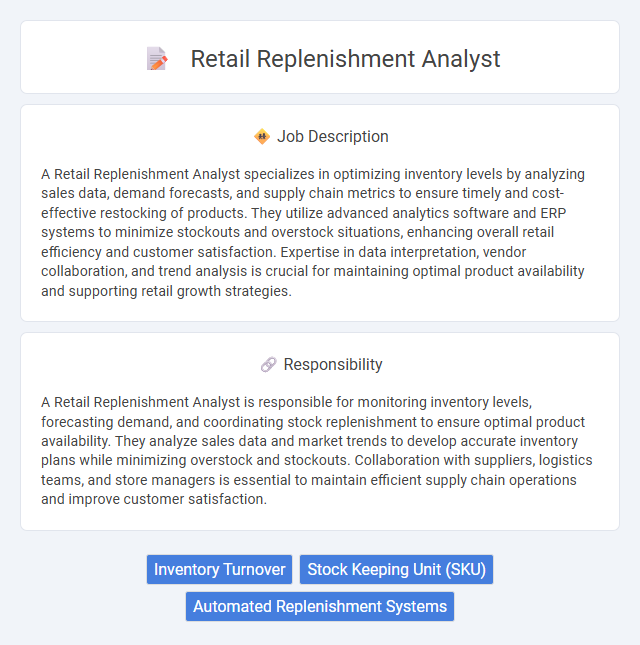
A Retail Replenishment Analyst specializes in optimizing inventory levels by analyzing sales data, demand forecasts, and supply chain metrics to ensure timely and cost-effective restocking of products. They utilize advanced analytics software and ERP systems to minimize stockouts and overstock situations, enhancing overall retail efficiency and customer satisfaction. Expertise in data interpretation, vendor collaboration, and trend analysis is crucial for maintaining optimal product availability and supporting retail growth strategies.
Individuals with strong analytical skills and a detail-oriented mindset will likely be well-suited for a Retail Replenishment Analyst role, as it requires managing inventory levels and forecasting demand accurately. Candidates comfortable with using data-driven tools and interpreting sales trends may have a higher probability of success in optimizing stock availability. Those who prefer dynamic environments and enjoy problem-solving could find this job particularly fitting, while people favoring routine or less data-centric tasks might not thrive as easily.
Qualification
Retail replenishment analysts require strong analytical skills with proficiency in inventory management software and demand forecasting tools. A background in supply chain management, logistics, or business analytics is essential, often supported by a bachelor's degree in these fields. Expertise in data analysis, Excel, and ERP systems enables efficient stock level optimization and accurate sales trend interpretation.
Responsibility
A Retail Replenishment Analyst is responsible for monitoring inventory levels, forecasting demand, and coordinating stock replenishment to ensure optimal product availability. They analyze sales data and market trends to develop accurate inventory plans while minimizing overstock and stockouts. Collaboration with suppliers, logistics teams, and store managers is essential to maintain efficient supply chain operations and improve customer satisfaction.
Benefit
A retail replenishment analyst role likely offers significant benefits in optimizing inventory levels to reduce stockouts and overstock situations, improving overall sales performance. This position probably enhances decision-making through data-driven insights, leading to increased efficiency and cost savings for the business. There may also be opportunities for professional growth as the analyst gains expertise in supply chain management and retail analytics.
Challenge
The role of a retail replenishment analyst likely involves navigating complex inventory patterns and forecasting demand with high accuracy to prevent stockouts or overstock situations. They probably face challenges related to rapidly changing consumer preferences and supply chain disruptions that complicate replenishment schedules. Effectively balancing these factors may require advanced data analysis skills and the ability to adapt strategies to maintain optimal stock levels.
Career Advancement
Retail replenishment analysts utilize data-driven strategies to optimize inventory levels, directly impacting sales performance and customer satisfaction. Mastery in demand forecasting, supply chain management, and ERP software can lead to roles such as Senior Analyst, Supply Chain Manager, or Inventory Control Supervisor. Continuous skill development in analytics and cross-functional collaboration significantly accelerates career growth within retail operations.
Key Terms
Inventory Turnover
A Retail Replenishment Analyst specializes in optimizing inventory turnover by analyzing sales trends, stock levels, and supplier lead times to ensure timely replenishment of products. They utilize advanced forecasting models and data analytics to maintain optimal inventory levels that minimize stockouts and overstock situations. This role directly impacts revenue by improving inventory efficiency and aligning supply with customer demand.
Stock Keeping Unit (SKU)
A Retail Replenishment Analyst specializes in managing and optimizing Stock Keeping Unit (SKU) levels to ensure consistent product availability across all sales channels. By analyzing sales trends, inventory data, and demand forecasts, the analyst identifies replenishment needs for each SKU to minimize stockouts and reduce excess inventory. Effective SKU-level management enhances supply chain efficiency, improves customer satisfaction, and maximizes profitability.
Automated Replenishment Systems
A Retail Replenishment Analyst specializes in optimizing stock levels using Automated Replenishment Systems (ARS) to enhance inventory accuracy and reduce stockouts. Proficiency in ARS software such as Oracle Retail and JDA Software allows analysts to forecast demand accurately and streamline order processes, improving supply chain efficiency. Data-driven insights generated by these systems enable strategic decision-making, supporting seamless inventory flow across multiple retail locations.
 kuljobs.com
kuljobs.com